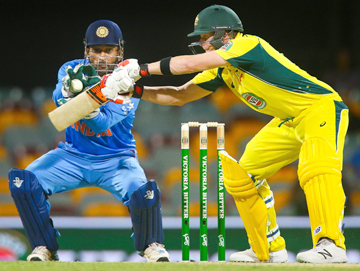India faces backfire over refusal of umpire reviews
Perth, Australia (AFP) Skipper Mahendra Singh Dhoni says he remains
unconvinced by the merits of the Decision Review System despite India
appearing to get a wrong decision in their opening one-day international
loss to Australia.
|

Australian batsman Steven Smith attempts to cut a ball as
Indian wicketkeeper MS Dhoni anticipates a catch during
their one-day international cricket match in Brisbane on
January 15, 2016. AFP PHOTO |
India's lack of faith in the use of DRS proved costly as George
Bailey overcame what should have been a first-ball dismissal late
Tuesday to help Australia reel in the tourists 309 for three with four
balls and five wickets to spare in the Perth one-dayer.
Bailey went on to score 112 off 120 balls and man-of-the-match Steve
Smith hit 149 from 135 balls as the Australians easily ran down India's
total, which was boosted by an unbeaten 171 by Rohit Sharma and captain
Virat Kohli's 91.
"It could have (changed the outcome of the game)," Dhoni said of the
Bailey incident.
"But at the same time, we need to push the umpires to make the right
decision.
"You have to see how many 50-50 decisions (don't) go in our favour,
and it always happens and then you have to take it. But I'm still not
convinced on DRS."
The match's pivotal moment came in the fifth over of Australia's
innings when Bailey appeared to glove his first ball down legside to
Dhoni off debutant paceman Barinder Sran.
Television replays confirmed the contact between ball and glove, but
with no DRS technology in place for any series involving India, the
visitors were unable to challenge umpire Richard Kettleborough's
decision of not out.
When asked by broadcaster Channel Nine about a potential DRS
reversal, Bailey said: "We're not the team that doesn't want it."
When asked to clarify whether he thought India was being punished for
their refusal to embrace DRS by finishing on the wrong side of line-ball
decisions, Dhoni said with a smile: "I may agree with you."
The DRS uses ball-tracking and thermal imaging to verify umpires'
decisions. It was made optional, rather than compulsory, at India's
insistence.
India, which accounts for the lion's share of global cricket
revenues, has been suspicious of DRS since making a number of
unsuccessful referrals during the 2008 Test series with Sri Lanka, when
the technology was on trial.
But most other cricketing nations including England and Australia
support the system.
|

